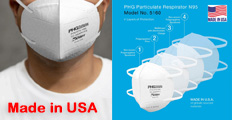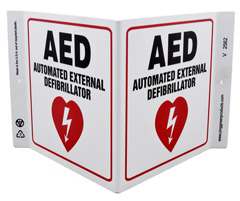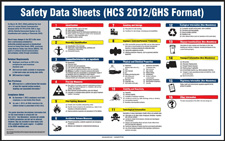



Find all of your laboratory and workplace safety supplies at Safety Emporium!
 Swiss Poison Class |
 Glossary Index |
 Systemic |
| MSDS Topics |
Free Sites | FAQ's | Regulations | Glossary | Software | Suppliers |
| Books | Forum | Poll | Fun stuff | Quiz | Store | |
| Understand your MSDS with the MS-Demystifier | Search ALL our MSDS info | |||||

Get your AED and other wall-projecting safety signs from Safety Emporium.
Syncope is a temporary or brief suspension of consciousness due to deficiency of oxygen in the brain (see hypoxia), sudden lowering of one's blood pressure, etc. Synonyms are "fainting" and "swooning".
Syncope or fainting denotes a short-term (transient) effect. A state of prolonged unconciousness from which the victim can not be awakened is called a coma.
When someone passes out, there is always the additional danger of head, neck and/or back injuries if they fall. Exercise caution when assisting someone who has fainted to avoid aggravating these secondary injuries.
This is a fancy word for "fainting spell" on Safety Data Sheets. Fainting can occur for many reasons, such as standing up too fast, inhalation of an organic chemical, low blood sugar (from not eating), fatigue, a panic attack or other medical conditions.
Anyone who suffers an unexplained fainting spell should be medically evaluated, particulary if this happens more than once or is associated with palpitations, bradycardia (slow heart beat; or irregular heartbeat) or exercise.

Ensure your workers are trained with safety posters and more at Safety Emporium.
See also: bradycardia, coma, tachycardia.
Additional definitions from Google and OneLook.
Entry last updated: Monday, January 16, 2023. This page is copyright 2000-2025 by ILPI. Unauthorized duplication or posting on other web sites is expressly prohibited. Send suggestions, comments, and new entry desires (include the URL if applicable) to us by email.
Disclaimer: The information contained herein is believed to be true and accurate, however ILPI makes no guarantees concerning the veracity of any statement. Use of any information on this page is at the reader's own risk. ILPI strongly encourages the reader to consult the appropriate local, state and federal agencies concerning the matters discussed herein.